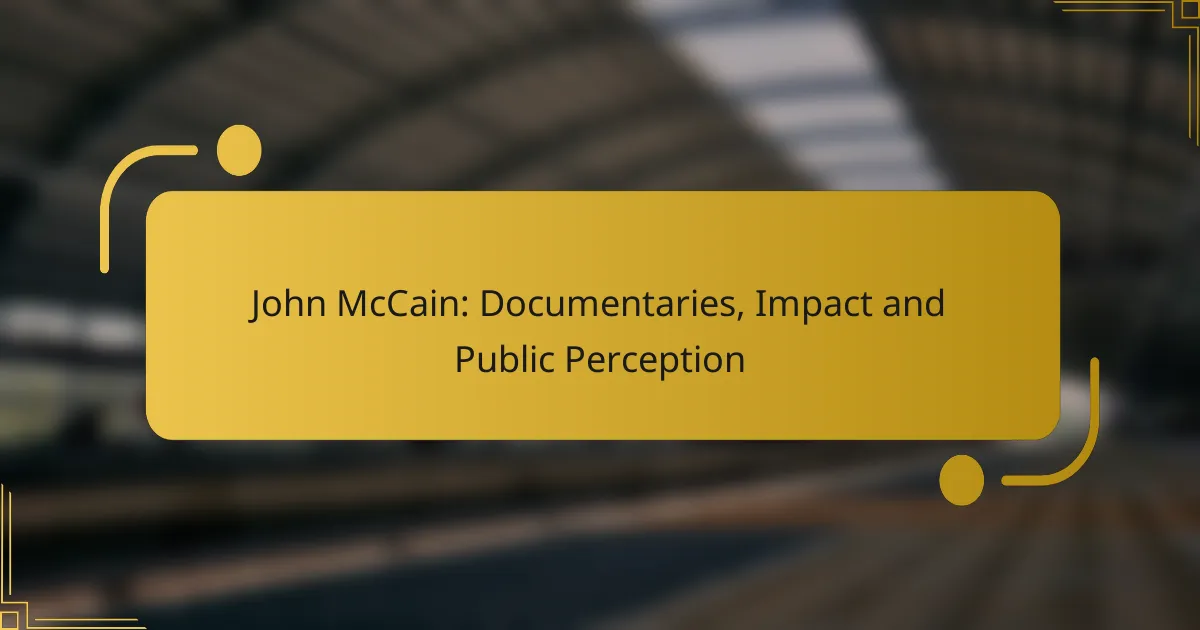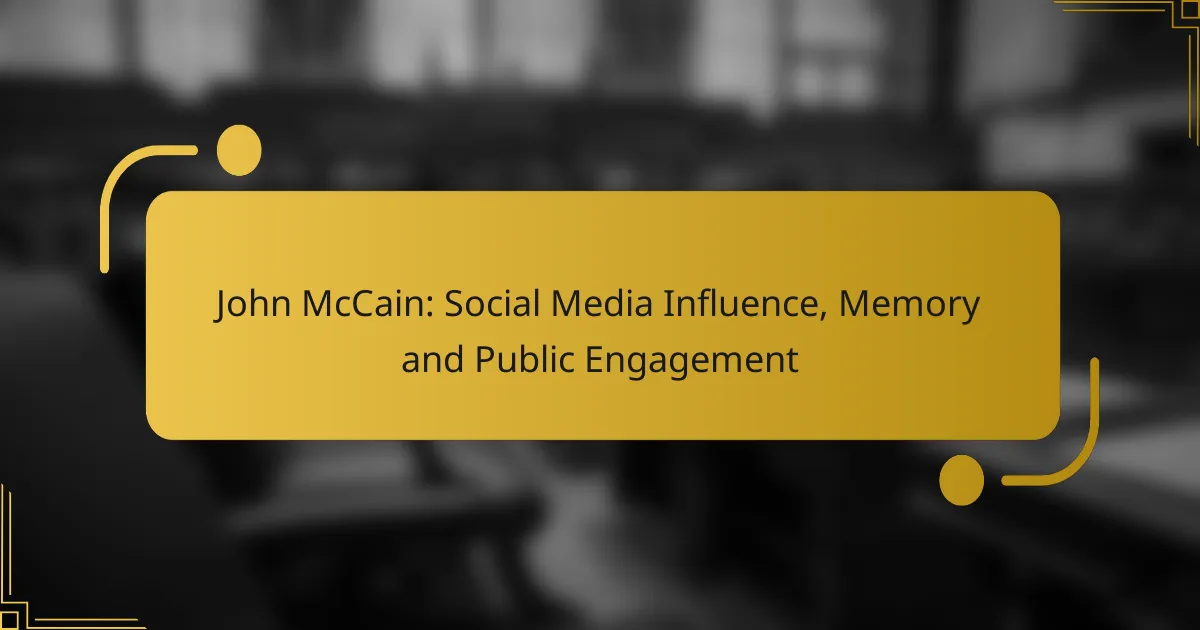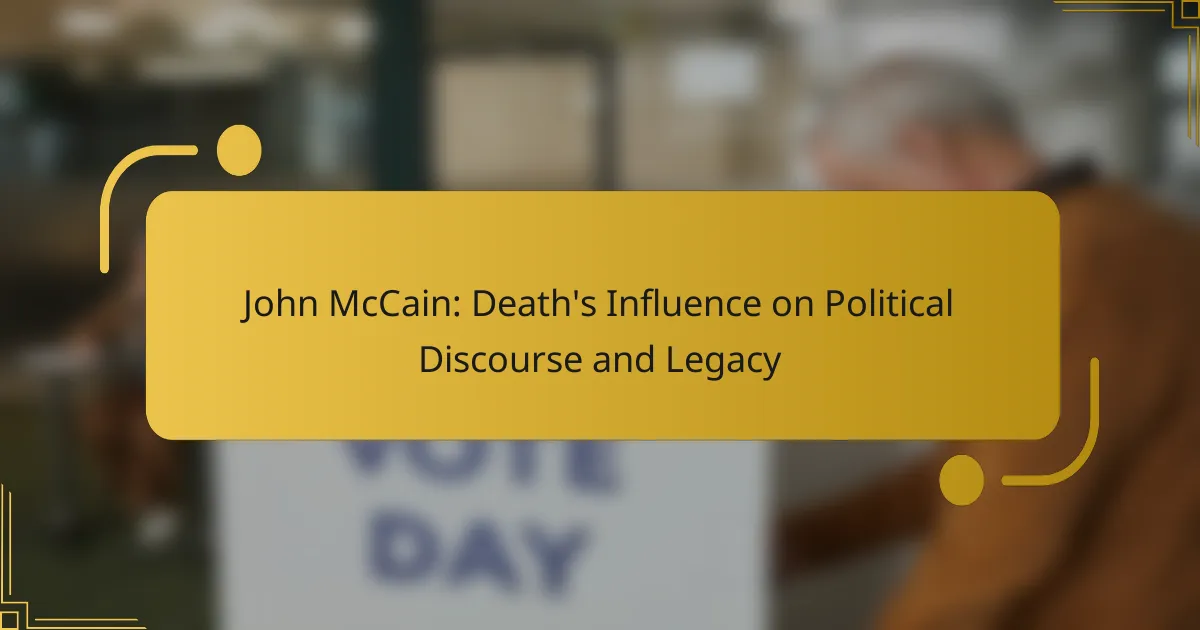John McCain’s life and career are captured in several documentaries that explore his military service, political journey, and personal philosophies. His commitment to bipartisanship and integrity left a lasting impact on American politics, shaping key legislation and foreign policy. However, public perception of McCain is complex, as he is respected by many for his service while also facing criticism for his political decisions.

What documentaries feature John McCain?
Several documentaries highlight John McCain’s life and career, showcasing his military service, political journey, and personal philosophies. These films provide insights into his character and the impact he had on American politics.
John McCain: For Whom the Bell Tolls
This documentary focuses on McCain’s experiences as a prisoner of war during the Vietnam War. It delves into the psychological and physical challenges he faced, illustrating his resilience and commitment to his country.
The film features interviews with fellow POWs and military experts, providing a comprehensive view of McCain’s time in captivity and how it shaped his views on war and peace.
John McCain: The Last Hero
“John McCain: The Last Hero” presents a detailed account of McCain’s political career, emphasizing his bipartisan efforts and dedication to public service. The documentary highlights key moments, including his presidential campaigns and significant legislation.
Through interviews with family, friends, and political allies, the film paints a portrait of McCain as a complex figure who navigated the challenges of American politics while staying true to his principles.
McCain
The documentary “McCain” offers a broader overview of his life, from his early years to his final days. It captures his evolution as a politician and the legacy he left behind, particularly in the context of contemporary American politics.
Featuring archival footage and personal anecdotes, this film provides a nuanced perspective on McCain’s impact on the nation, making it a valuable resource for understanding his contributions and challenges.

What impact did John McCain have on American politics?
John McCain significantly influenced American politics through his commitment to bipartisanship, military service, and a reputation for integrity. His approach often bridged party lines, shaping key legislation and foreign policy decisions that resonate even today.
Influence on bipartisan legislation
John McCain was a staunch advocate for bipartisan legislation, often collaborating with members from both parties to achieve common goals. His work on the McCain-Feingold Act, which aimed to reform campaign finance, exemplifies his dedication to creating a fair electoral process.
Throughout his career, McCain emphasized the importance of compromise, believing that effective governance requires cooperation. This approach led to significant achievements, such as the comprehensive immigration reform efforts in the early 2000s, which sought to address complex issues through collaborative solutions.
Role in military and foreign policy
As a veteran and former prisoner of war, McCain’s insights into military and foreign policy were deeply informed by personal experience. He was a vocal supporter of a strong military presence globally, advocating for interventions in conflicts where he believed American values and interests were at stake.
McCain played a crucial role in shaping U.S. responses to international crises, including his support for military action in Libya and Syria. His stance often emphasized the need for America to lead in promoting democracy and human rights worldwide.
Legacy of political integrity
John McCain’s legacy is marked by a reputation for political integrity, characterized by his willingness to speak truth to power. He often prioritized principles over party loyalty, earning respect across the political spectrum.
His famous quote, “We are Americans,” during his concession speech in the 2008 presidential election, highlighted his commitment to unity and respect for democratic processes. McCain’s integrity continues to inspire politicians and citizens alike to prioritize honesty and accountability in public service.

How is John McCain perceived by the public?
John McCain is perceived as a complex figure, often viewed with respect for his military service and political career, but also with criticism for his stances and decisions. Public opinion varies significantly based on political affiliation, with some viewing him as a principled leader and others as a controversial politician.
Public approval ratings
Public approval ratings for John McCain fluctuated throughout his career, reflecting his political actions and the changing political landscape. During his presidential campaign in 2008, his approval ratings were generally in the low to mid-40s percentage range, but they saw a resurgence after his passing in 2018, often reaching higher levels of public admiration.
Factors influencing these ratings included his bipartisan efforts, particularly on issues like immigration reform and healthcare, which resonated with many voters. However, his support for certain military interventions and party lines also drew criticism from various segments of the population.
Perception among veterans
Among veterans, John McCain is largely respected due to his own service and experiences as a prisoner of war. Many veterans admire his commitment to military issues and veterans’ rights, viewing him as a champion for their needs in Congress.
However, some veterans also express frustration with his political decisions, particularly regarding military funding and foreign policy. This duality reflects the diverse opinions within the veteran community, shaped by personal experiences and political beliefs.
Media portrayal
The media portrayal of John McCain has evolved over time, often reflecting the political climate. Initially, he was seen as a maverick willing to cross party lines, which garnered both positive and negative coverage depending on the issue at hand.
Posthumously, many media outlets have focused on his legacy of service and integrity, highlighting his willingness to stand up against his party when he believed it was necessary. This shift in portrayal underscores the impact of his life and career on public perception, contributing to a more favorable view in recent years.

What are the key themes in McCain’s documentaries?
John McCain’s documentaries highlight themes of leadership, resilience in politics, and personal struggles. These films provide insight into his character and the values he upheld throughout his life and career.
Leadership and sacrifice
McCain’s documentaries often emphasize his leadership style, which was marked by a commitment to service and sacrifice. He believed in putting the country first, showcasing his willingness to endure personal hardships for the greater good.
For instance, his time as a prisoner of war illustrated profound sacrifice, where he refused to accept early release in order to uphold the honor of his fellow soldiers. This theme resonates with audiences who value integrity and dedication in leadership.
Political resilience
Political resilience is a central theme in McCain’s documentaries, reflecting his ability to navigate challenges and setbacks throughout his career. His candidacy for the presidency, despite numerous obstacles, exemplifies his tenacity and commitment to his principles.
McCain’s willingness to cross party lines and work with opponents highlights his belief in bipartisanship, which remains relevant in today’s polarized political climate. His story encourages viewers to remain steadfast in their beliefs, even when faced with adversity.
Personal struggles
The documentaries also delve into McCain’s personal struggles, including his battles with health issues and the emotional toll of his political life. These experiences humanize him, making his achievements more relatable to the audience.
By sharing his vulnerabilities, McCain inspires others to confront their own challenges with courage. His journey illustrates that personal struggles can shape one’s character and contribute to a greater purpose in life.

How did John McCain’s military service shape his career?
John McCain’s military service significantly influenced his political career, instilling values of leadership, resilience, and a deep commitment to national security. His experiences as a naval aviator and a prisoner of war (POW) shaped his perspectives on military policy and foreign affairs, making him a prominent voice in these areas throughout his political life.
Experience as a POW
As a POW during the Vietnam War, John McCain endured years of torture and isolation, which profoundly impacted his character and worldview. His resilience in the face of adversity became a defining aspect of his identity, fostering a strong sense of duty and honor that resonated with many Americans. This experience also deepened his understanding of the sacrifices made by military personnel, influencing his advocacy for veterans’ issues.
McCain’s time in captivity highlighted the importance of ethical treatment of prisoners and informed his later legislative efforts to improve conditions for service members. He often spoke about the need for humane treatment in conflict, which became a cornerstone of his military policy discussions.
Influence on military policy
John McCain’s military background provided him with a unique perspective on military policy, leading him to advocate for a robust national defense and a proactive foreign policy. He believed in the necessity of a strong military to deter threats and protect American interests globally. His positions often emphasized the importance of military readiness and the need for strategic alliances.
Throughout his career, McCain supported various military initiatives and interventions, arguing that the U.S. should take decisive action against authoritarian regimes. His influence was evident in debates over military funding and foreign military engagements, where he consistently pushed for policies that reflected his commitment to national security and global stability.

What lessons can be learned from John McCain’s life?
John McCain’s life offers valuable lessons in leadership, resilience, and the importance of principled decision-making. His experiences highlight the significance of bipartisanship and integrity in politics, which can inspire current and future leaders to prioritize collaboration and ethical standards.
Importance of bipartisanship
Bipartisanship was a cornerstone of John McCain’s political philosophy. He believed that working across party lines was essential for effective governance and addressing the needs of the American people. This approach often led to significant legislative achievements, such as the McCain-Feingold Act on campaign finance reform.
To foster bipartisanship, politicians should focus on common goals rather than partisan differences. Engaging in open dialogue and seeking compromise can lead to more sustainable solutions. For instance, initiatives like the Affordable Care Act saw varying degrees of bipartisan support, demonstrating the potential for collaborative efforts.
Value of integrity in politics
Integrity was a defining trait of John McCain’s career, earning him respect from both supporters and opponents. He consistently prioritized honesty and transparency, even when it was politically disadvantageous. This commitment to ethical conduct helped build trust with constituents and colleagues alike.
Maintaining integrity in politics requires a steadfast adherence to one’s principles, even in the face of pressure. Politicians should strive to communicate openly with the public and avoid misleading statements. By doing so, they can cultivate a reputation for reliability, which is crucial for long-term success in public service.



